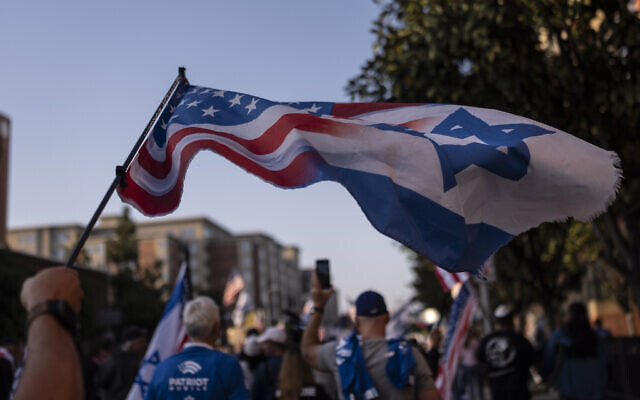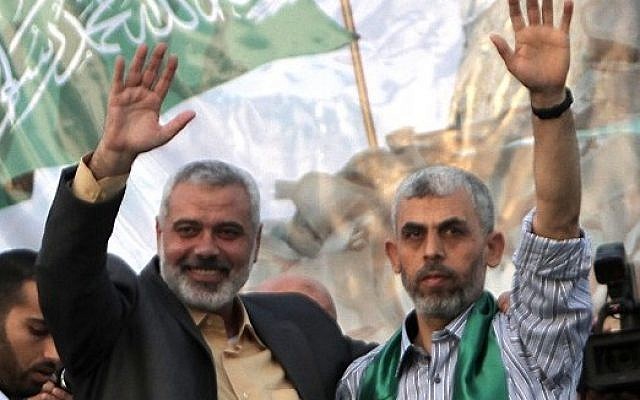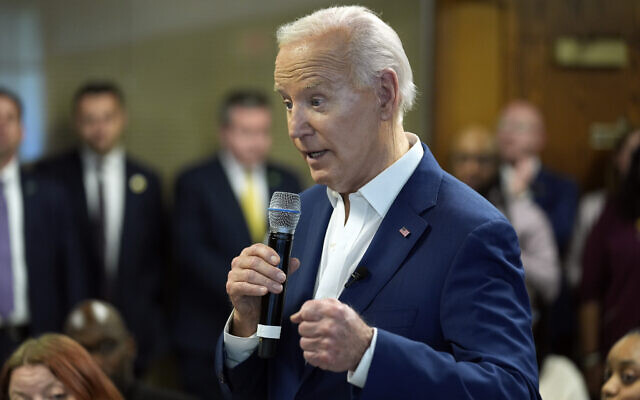US says Israel using weapons in line with international law, not blocking Gaza aid
State Department says Israel’s use of American weapons meets requirements of new national security memorandum, complies with humanitarian law

The US has deemed Israel to be in compliance with a new national security memorandum after it received a written assurance from Jerusalem that it is using American weapons in line with international law and is not blocking humanitarian assistance in Gaza.
This assurance came last week via a “credible high-level official who has the ability and authority to make decisions and commitments about the issues at the heart of the assurances,” State Department spokesperson Matthew Miller said, referring to the letter sent by Defense Minister Yoav Gallant.
“These assurances are prospective, but of course, our view of them is informed by our ongoing assessments of Israel’s conduct in the war in Gaza,” Miller said during a press briefing.
“We’ve had ongoing assessments of Israel’s compliance with international humanitarian law. We have not found them to be in violation, either when it comes to the conduct of the war or the provision of humanitarian assistance. We view those assurances through that ongoing work we have done,” he said.
The State Department has until May 8 to provide Congress with a report on Israel’s compliance with the memo.
The announcement came on the same day that the US abstained from a vote at the United Nations Security Council calling for a ceasefire in Gaza and the release of the hostages taken on October 7, without linking the two issues. The resolution, backed by Russia and China, passed with 14 votes.

The vote sparked a spat with Israel, which argued that its passage would make Hamas more obstinate in truce talks in Qatar. Prime Minister Benjamin Netanyahu also canceled a planned trip to Washington by his top aides to discuss plans for an offensive in the Gaza city of Rafah.
Tensions have been escalating over Israel’s plans for a large-scale ground operation in the southern Gaza city, which is both Hamas’s last major stronghold in the Strip and where over a million Gazans displaced by the fighting are now located.
Washington and Jerusalem have also disagreed on the flow of humanitarian aid to Gaza, with Israel blaming the ailing humanitarian situation on aid agencies’ failure to distribute supplies, and on Hamas and armed groups who have looted trucks entering the Gaza Strip.
Hours after the Security Council vote, Hamas said it would insist on demands for a permanent ceasefire, a withdrawal of Israeli troops from Gaza, the return of displaced Palestinians to central and north Gaza, and a release of Palestinian security prisoners — demands Israel has already rejected repeatedly as delusional.
The White House has shown increasing willingness in recent months to voice dissatisfaction with Israel over civilian casualties in Gaza and the humanitarian situation there, including adopting a harsher tone.
US Secretary of State Antony Blinken was in Israel over the weekend on the last stop of his sixth diplomatic swing through the region since war erupted on October 7, amid mounting tensions between Washington and Jerusalem over the management of the conflict and Israel’s intent on a Rafah offensive.

Blinken held one-on-one meetings with both Netanyahu and war cabinet minister Benny Gantz on Friday, along with the war cabinet.
Blinken told reporters after his meetings that the US shares Israel’s goal of defeating Hamas and ensuring long-term security, but that “a major military ground operation in Rafah is not the way to do it.”
“It risks killing more civilians. It risks wreaking greater havoc with the delivery of humanitarian assistance. It risks further isolating Israel around the world and jeopardizing its long-term security and standing,” Blinken said on the Ben Gurion Airport tarmac just before boarding a plane to depart.
According to the Walla news site, in his meeting with Netanyahu and his war cabinet, Blinken also warned that if Israel does not come up with a plan for the “day after” Hamas, it will be stuck in Gaza for years.
“You don’t understand this,“ Blinken reportedly said, “and when you do, it might be too late.”
In Washington on Monday, Blinken met with a visiting Gallant at the State Department, warning again of the US’s opposition to a large-scale offensive in Rafah.
Blinken “underscored that alternatives exist to a major ground invasion that would both better ensure Israel’s security and protect Palestinian civilians,” State Department spokesman Matthew Miller said in a statement.
Gallant and Blinken additionally “discussed the need to immediately surge and sustain additional humanitarian assistance to meet the needs of civilians in Gaza,” he added.

Gallant’s written assurance is a new condition the US placed on all aid recipients, laid out in a memo signed by Biden on February 8. US security aid recipients were already required to use the funds in line with international law, though the request for written assurances was new.
The directive does not single out Israel, but it came at a time of increasing calls from progressive lawmakers for conditions on US aid to the Jewish state, amid concerns that Jerusalem was not doing enough to protect civilians in Gaza.
The February 8 memo stated that US departments and agencies will “engage with foreign partners to share and learn best practices for reducing the likelihood of and responding to civilian casualties, including through appropriate training and assistance.”
“In order to effectively implement certain obligations under United States law, the United States must maintain an appropriate understanding of foreign partners’ adherence to international law, including, as applicable, international human rights law and international humanitarian law.”
Countries receiving military aid from the US were given 180 days to provide the required assurances, the memo said, but those, like Israel, who were engaged in active conflicts had only 45 days.
US officials left open the possibility that arms sales could be halted or delayed without the assurance.
The memo was criticized by the American Israel Public Affairs Committee at the time, which called it “an unnecessary directive that imposes new requirements on Israel and our other most important allies.”










